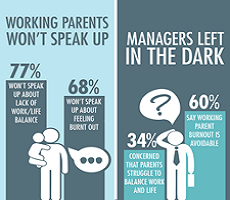November 10, 2015
Research reveals the main reasons why people still go to work when ill 0
 High job demands, stress and job insecurity are among the main reasons why people go to work when they are ill and should probably stay home, according to new research from the University of East Anglia. The study sets out to improve understanding of the key causes of employees going to work when sick, which is known as one of the main forms of presenteeism, and to help make managers more aware of the existence of the phenomenon, what triggers the behaviour and what can be done to improve employees’ health and productivity. A key finding of the study, published yesterday in the Journal of Occupational Health Psychology, is that presenteeism not only stems from ill health and stress, but from raised motivation, for example high job satisfaction and a strong sense of commitment to the organisation. This may motivate people to ‘go the extra-mile’, causing them to work more intensively, even when sick.
High job demands, stress and job insecurity are among the main reasons why people go to work when they are ill and should probably stay home, according to new research from the University of East Anglia. The study sets out to improve understanding of the key causes of employees going to work when sick, which is known as one of the main forms of presenteeism, and to help make managers more aware of the existence of the phenomenon, what triggers the behaviour and what can be done to improve employees’ health and productivity. A key finding of the study, published yesterday in the Journal of Occupational Health Psychology, is that presenteeism not only stems from ill health and stress, but from raised motivation, for example high job satisfaction and a strong sense of commitment to the organisation. This may motivate people to ‘go the extra-mile’, causing them to work more intensively, even when sick.



















 The commercial property markets in the world’s major cities are evolving against a backdrop of ongoing economic and political uncertainty, according to
The commercial property markets in the world’s major cities are evolving against a backdrop of ongoing economic and political uncertainty, according to 














October 26, 2015
An updated green building standard designed to meet wider business objectives 0
by Sue Gregson • Comment, Facilities management, Legal news, Property
(more…)